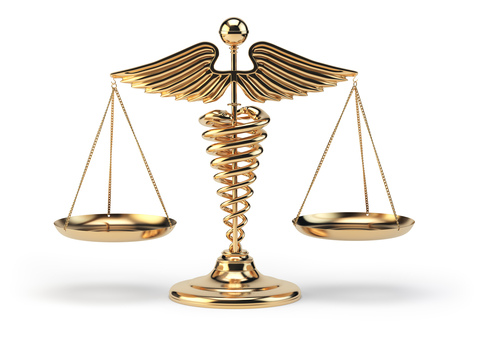During one of our medical ethics lectures, Dr. David Beyda posed a question: Should convicted prisoners be eligible to receive organ transplants, even if it means preventing other members of society from receiving them? Unsurprisingly, the majority of our class voted no; after all, who could argue against the logic of a child receiving a heart transplant over a convicted murderer?
While on my Internal Medicine rotation at Banner University Medical Center, one of the first patients I took care of was a polite and soft-spoken man in his twenties who was an inmate at the nearby state prison. I vividly remember his room—one arm and one leg shackled to the bed, two ever-present and constantly bored guards. This heavy security was made all the more poignant by the paradox that his heart was more or less dead, and he was permanently attached to a dobutamine drip without which he would expire within a few moments, making a successful escape unlikely and, at very best, temporary. He had a terminal congenital heart condition which, while no doubt had been deteriorating his whole life, presented suddenly and severely. Perhaps had he not been incarcerated, the condition could have been detected sooner, but at this point, the only curative treatment for him was heart transplant. He was young and healthy, and luckily had no other medical issues, which made him an excellent surgical candidate.
I later came to learn that he had committed a capital offense ten years ago—a severe crime which contrasted sharply with the impression of the actual patient in front of me. In fact, he was one of the most polite and serene patients I took care of that rotation, consistently calm in the face of his circumstances.
In order to receive any sort of transplant, patients must prove adequate social support, which as a prisoner, he did not have. However, he had a very supportive family back in his home state, so his first step in seeking treatment was to apply for compassionate release from his home state where he was originally convicted. Compassionate release allows a prisoner immediate eligibility for parole without having served his full term for “extraordinary or compelling circumstances,” such as a terminal medical condition. In order to facilitate both compassionate release and, thereby, eligibility for potential transplant, he was stabilized enough to be transferred to a hospital in his home state. The Department of Corrections agreed to transport him and started prepping him for a flight scheduled the next week. He was even told about the flight, although he was not told the details as prisoners are never informed of exact travel plans lest they plan an escape. Someone even drew the state’s flower on his whiteboard in exquisite detail, a show of effort that demonstrated how much the staff had come to care for him.
However, only one hospital in his home state had the expertise to manage his condition, and they abruptly declined the transfer. With no clear next step in his process and uncertainty regarding his compassionate release, he was transferred off of my service and that was the last I heard of him.
I was bothered by this ending, with an uneasy feeling that injustice was done. Personhood is the ethical principle that all people have inherent moral status and worth that cannot be alienated. Like most of the concepts of medical ethics, this idea is hard to fully appreciate before experiencing the situation firsthand. I understand now that I was troubled by the hospital declining his transfer. His access to the quality of healthcare that you or I might expect was compromised, violating his personhood. They were complicating and delaying his ability to receive a heart transplant, and time was not something that he had to spare. In addition, they were denying a dying man the ability to be with his family in what might be his final days. Through all of these things, the hospital had essentially deemed him less than a full person.
This prisoner showed me how significant and applicable the concept of personhood and, by extension, all of medical ethics truly are. Medical ethics is the lens by which we can analyze the situations in the hospital that give us moral pause. While it is simple to sit in a classroom voting one way or another to decide who lives and who dies, the reality is much more complex and nuanced than abstract votes of yes or no. I suspect that if the poll were to be retaken now that we have experienced months of rotation, the percentages would be switched.
- “Compassionate Release and the First Step Act: Then and Now.” FAMM, famm.org/wp-content/uploads/Compassionate-Release-in-the-First-Step-Act-Explained-FAMM.pdf.
Ian Singleton is a member of The University of Arizona College of Medicine – Phoenix, Class of 2021. He graduated from University of California, Santa Barbara with a Bachelor of Science in Microbiology. He enjoys working out and surfing.


